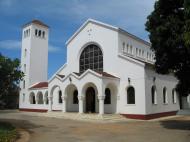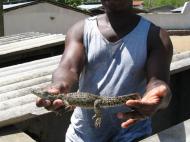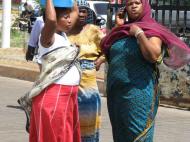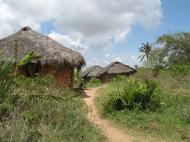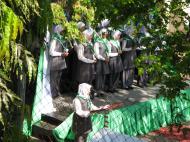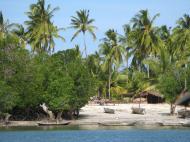The United Republic of Tanzania 2007
The United Republic of Tanzania 2007
Dmitri M. Bondarenko
Oleg I. Kavykin
Anastasia A. Banschikova
RUSSIAN EXPEDITION TO THE UNITED REPUBLIC OF TANZANIA
On October 26 – November 18, 2007 a team of Russian Cultural Anthropologists from the Institute for African Studies had been doing short-term fieldwork in the United Republic of Tanzania (in the cities of Arusha, Dar es Salaam, Kilwa Masoko, Moshi, on the islands of Kilwa Kisiwani, Songo Mnara, and Zanzibar). The study was supported by the Russian Foundation for Humanitarian Studies (grants # 06-01-02083а and 06-01-02062а) and the Russian Center of Science and Culture in the United Republic of Tanzania. The research team consisted of Anastasia A. Banschikova, Dmitri M. Bondarenko (Head), Tatiana V. Evgenyeva, Oleg I. Kavykin, Daria A. Khaltourina, Andrey V. Korotayev, and Anatoliy D. Savateev.
The fieldwork in Tanzania was a continuation of the research projects: “The Image of Contemporary Russia in African Countries: Formation and Specific Features” and “Russia and Islam: A Civilization Dialog”, started with the expedition to the Federal Republic of Nigeria in 2006, as well as by the expeditions to Tanzania in 2003 and 2005.
These projects’ elaboration presupposes a study of the prerequisites for the post-Soviet Russia image’s formation in connection with the history and present-day state of the Soviet- and Russian-African relations, revealing of the image’s characteristic features, of the prospects for and terms of its positive transformation, particularly in the contexts of the Christian Muslim relations and globalization processes in contemporary world among others. Within this project the task of a systematic research into the holistic image of Russia and her citizens in the consciousness of the inhabitants of a whole continent was set for the first time.
In the course of the fieldwork, a series of interviews (over 30) with representatives of Tanzanian intellectual, cultural, business, and political elite, i.e. with people capable of forming and transforming the image of Russia in the country’s populace mass-consciousness, was conducted. The interviews were conducted according to the plan used in Nigeria a year before. It included 18 questions; each interview usually took about 40 minutes and was taped. Besides, meetings with the Ambassador of the Russian Federation and the Embassy employees, with the staff of the Diplomatic Academy of Tanzania took place. The research problematics was also discussed with colleagues at the University of Dar es Salaam and Education College, as well as with the UNESCO representatives in the country. Non-formalized interviews with Russian people residing in the country permanently for a long time and considered as experts were taped, too. A photo archive was compiled.
The primary analysis of the Tanzanian evidence tend to confirm with the evidence of different sorts collected earlier, including that gained during the fieldwork in Nigeria.









